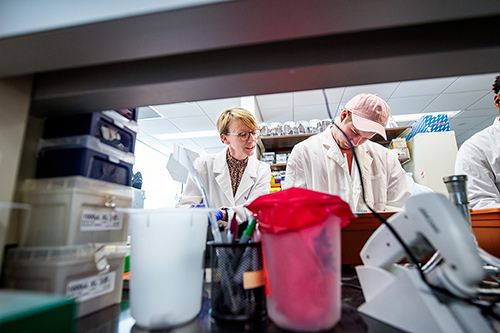MSU receives $8 million NSF grant to boost Mississippi science, technology capabilities

Heather Jordan, left, an associate professor in Mississippi State's Department of Biological Sciences, conducts research in insect agriculture with students in Harned Hall. PHOTO: Public Affairs
Mississippi’s leading research university is receiving $8 million from the National Science Foundation to lead transformative science and technology capacity-building efforts across the state.
The four-year NSF award to Mississippi State establishes the Mississippi Research Alliance as a central hub for the state’s research ecosystem, leveraging existing strengths, expanding networks, and creating new opportunities to advance research and development. The funding is part of NSF’s Established Program to Stimulate Competitive Research program Collaborations for Optimizing Research Ecosystems Research Infrastructure Improvement Program, or E-CORE RII.
“Our state has some of the best research institutions and most talented researchers, but they have often been disconnected from one another. This grant will centralize the efforts of four Mississippi universities, resulting in a better statewide research ecosystem. I fought to increase the funding stream that made this grant possible, and I am glad Mississippi State University is leading the way on this effort,” Sen. Roger Wicker, R-Miss., said.
In addition to MSU, collaborating institutions include Mississippi Valley State University, the University of Mississippi, and the University of Southern Mississippi. The grant funds a new portal for shared research instrumentation and a statewide directory of researchers to assist with forming interdisciplinary team networks. Funding also supports faculty startup packages, instrumentation purchases and voucher grants, seed grants for collaborative activities, instrumentation voucher grants, and travel awards for networking and training.
Katie Echols, executive director for research initiatives and innovation in MSU’s Office of Research and Economic Development, is the state of Mississippi’s EPSCoR director and the grant’s principal investigator. CO-PI’s include MSU’s Tonia Lane, director of the Institute for Imaging and Analytical Technologies; MVSU’s Victor Bii, bioinformatics assistant professor and program coordinator; UM’s Nathan Hammer, chemistry and biochemistry professor; and USM’s Alex Flynt, associate professor of biological, environmental and earth sciences.
“The Mississippi Research Alliance is going to have a transformative impact on our state by enhancing and connecting our entire research ecosystem,” said MSU Vice President for Research and Economic Development Julie Jordan. “By linking the exceptional talent and cutting-edge resources across the state, we are fostering networks of innovation that will lead to groundbreaking discoveries and advancements, touching the lives of all Mississippians. I thank our state’s congressional delegation for supporting this investment in Mississippi’s future.”
NSF Director Sethuraman Panchanathan said, “The NSF EPSCoR program is critical to ensure that we are creating opportunities and investing in innovation in every part of the United States. These new E-CORE and E-RISE awards will positively impact our nation by advancing the breadth of STEM research, research infrastructure and workforce development, while catalyzing opportunities for research and education in EPSCoR jurisdictions and beyond.”
The newly formed alliance will be guided by university representatives, industry leaders, government officials, K-16 educators, non-profit groups and other stakeholders. The NSF has the option to renew the award for an additional four years and $8 million following the initial award cycle.
For more on research at MSU, visit www.research.msstate.edu.
Mississippi State University is taking care of what matters. Learn more at www.msstate.edu.
James Carskadon | High Performance Computing Collaboratory



